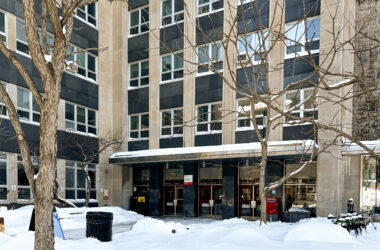The release of Dean Jutras’ report on the events of Nov. 10 was the main focus of the SSMU Legislative Council last Thursday. While slow initially, discussion branched off into varied opinions of the report itself and how SSMU should move forward.
Several councilors and executives said that while they felt that the report was somewhat helpful, it was also rather vague and did not provide explicit direction for further action. However, there was also a general consensus that this was a fair expectation given the Dean’s role, and would have even been inappropriate if he had proposed otherwise.
“When I first read [it], I read the recommendations and I thought they were pretty fluffy,” Law Councilor Ian Clarke said during Council. “But upon further review I thought it would have been inappropriate for the Dean […] to make a unilateral recommendation.”
One notable objection to the report, brought forward by SSMU VP University Affairs Emily Clare, was the lack of a student-focused perspective, given that the primary victims were students, as well as the missing testimony of Professor Greg Mikkelson, who was pepper sprayed.
“The report was commendable but it seemed to put the experience of students at the same level of everyone else,” Clare said. “I felt that the primary victims of Nov. 10th were students and I thought that that was underwritten. There [also] seemed to be a lack of the human aspect, the human kind of pain of Nov. 10.”
The discussion then turned to what students should do in light of this report. Talks of dialogue surfaced all evening: councilors called for more dialogue with the administration, more dialogue about security, and more dialogue at the upcoming Senate meeting this Wednesday.
Later, SSMU VP External Joël Pedneault suggested the possibility that SSMU take McGill to court. Currently, SSMU is collecting testimonials of students affected during the events of Nov. 10 to discern if such a course of action would be appropriate.
“The intention is to see whether there is any possibility of launching individual or class action lawsuits against the university in order to obtain redress before a court of law,” Pedneault later explained in an email to the Tribune.
Pedneault said that although discussions may be fruitful, going to court may end up being the necessary course of action, given past precedents and past discussions with the administration.
“A potential benefit of a lawsuit would be to demonstrate without the shadow of doubt that certain things can in fact happen even in a place like McGill University,” Pedneault wrote. “For example, McGill’s Security Services acted in a brutal manner towards students, but many people in the community are hesitant to accept this fact. Proving this fact in a public, official forum would help prevent this type of behaviour on the part of the university in the future.”
Later that evening, Education Councilor Kady Paterson inquired about the nature of SSMU’s own security policy.
“In the event that something happens in SSMU, we should have a plan,” Paterson said.
In a follow-up meeting with the Tribune, SSMU President Maggie Knight explained that although SSMU has a general emergency plan, there is no specific plan regarding a potential occupation. The details of this plan were not disclosed because of security reasons.
Other events of note at Council included the report of the Community Engagement Committee to fund a Social Equity and Diversity Education (SEDE) program for two internship positions with $5,000 drawn from funds provided by the new fifty cent student fee. The Council voted to send the Community Engagement Committee back for further examination and provide details, especially within the hiring process.
“I think a more thorough examination of the proposal through CEC and further discussion with SEDE will be a good process and will set a strong precedent for future funding allocations from the Charity Committee,” Knight said.
The one notable omission from the agenda was the renegotiation of the Shatner lease. In November, Council voted against accepting the administration’s current lease proposal for the Shatner building.
“The lease was discussed in the confidential portion of our meeting,” Knight later told the Tribune. “We provided the deputy provost with a lengthy memorandum in December outlining our concerns about the current lease proposal and suggesting ways to move forward, and, at Professor Mendelson’s recommendation, met again with Vilma Campbell, McGill’s negotiator, on Tuesday [Jan. 10]. Our lease committee will be meeting again this weekend and we have another meeting next Tuesday. Unfortunately I have no major progress to report at this time, but negotiations are continuing.”







